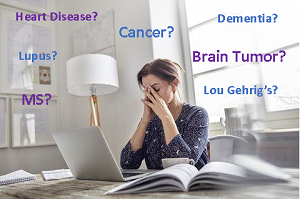
A serious health problem can disrupt all aspects of your life, whether it’s a chronic or life-threatening illness, such as cancer, or a major health event such as a stroke, heart attack, or debilitating injury.
Many serious health problems seem to develop unexpectedly, upsetting your life out of the blue. You may feel overwhelmed by waves of difficult emotions—from fear and worry to profound sadness, despair, and grief—or just numb, frozen by shock or the feeling that you’ll never be able to cope. The emotional upheaval can make it difficult to function or think straight, and even lead to mood disorders such as anxiety and depression.
But whatever your diagnosis or emotional response, it’s important to know that you’re not powerless. There are steps you can take to better cope with your new situation, ease the stress and mental anguish that often accompany serious illness, and find a way to navigate this challenging new journey.
Common emotional responses to serious illness include:
How you react emotionally and the degree of psychological distress you experience depends on many different factors, including your age, personality, the type and prognosis of the medical problem you’re facing, and the amount of support you have.
Whatever your situation, you should know that experiencing a wide range of difficult emotions is a normal response to a potentially life-changing situation. It doesn’t mean that you’re weak, going crazy, or won’t be able to meet the health and emotional challenges that lie ahead.
Coping with a serious illness
Tip 1: Reach out for support
- Facing a serious illness can make you feel isolated, but now is the time to seek support. Social connections boost mental health, helping both emotionally and practically. Studies show that people with strong support, like those who are married, tend to fare better after a diagnosis. Choose who you confide in carefully, but don’t try to handle everything alone. Loved ones won’t see you as a burden and will appreciate your trust. Prioritize face-to-face interactions for stress relief and consider joining a support group or peer program to connect with others who understand what you're going through.
Tip 2: Explore your emotions
- When facing a chronic or serious illness, it’s easy to fear your emotions and try to hide them. But bottling up feelings doesn’t help and may increase stress, pain, and anxiety. Studies show that forcing yourself to be cheerful doesn’t improve recovery. Instead, facing your emotions, even the tough ones, can ease stress and bring peace. Start by paying attention to how emotions feel in your body—like tension in your stomach or shoulders. When you allow yourself to feel, emotions will pass quickly, helping you cope better as you move through treatment.
Tip 3: Manage stress
Stress can worsen many health issues, like heart disease, high blood pressure, chronic pain, and cancer side effects. Managing stress can improve your health, aid recovery, and reduce medication needs.
Here are some tips to manage stress:
- Talk to someone: Face-to-face chats with a friend or loved one can relieve stress.
- Relax: Try mindfulness, deep breathing, or progressive muscle relaxation to calm down.
- Sleep well: Develop a relaxing bedtime routine to improve sleep and reduce stress.
- Stay active: Exercise relieves tension and boosts mood. Even light activity can help if mobility is limited.
Tip 4: Pursue activities that bring you meaning and joy
Your medical condition doesn’t define who you are. By engaging in activities that bring joy and meaning, you can focus on what truly makes you, you.
If your condition limits some activities, explore new ones:
- Revisit an old hobby or try something new like a class or club.
- Learn a skill—an instrument, language, or game.
- Get involved in your community through volunteering or events.
- Spend time in nature—garden, hike, or walk a dog.
- Enjoy the arts by visiting museums, attending events, or trying creative projects.
- Write about your experiences—memoirs, blogs, or guides.
Tip 5: Deal with anxiety and depression
It's normal to feel sad or worried when facing a serious illness, but if these feelings persist and interfere with daily life, you may be dealing with depression or anxiety. These mood disorders can worsen your health and make it harder to recover.
Here are ways to cope:
- Manage pain: Untreated pain can worsen anxiety and hopelessness. Work with your medical team to control symptoms.
- Challenge worries: Try not to assume the worst. Focus on finding balanced, realistic thoughts.
- Self-care: Talk to others, exercise, and maintain a healthy diet and sleep routine.
- Limit sugar: Reducing sugary foods can help stabilize your mood.
- Be mindful of caffeine, alcohol, and nicotine: Cutting back can reduce anxiety and improve overall mood.
Reference:
https://www.helpguide.org/wellness/health-conditions/coping-with-a-life-threatening-illness
https://www.jw.org/en/library/series/more-topics/deal-with-health-problem/